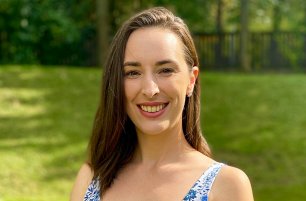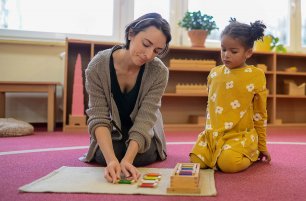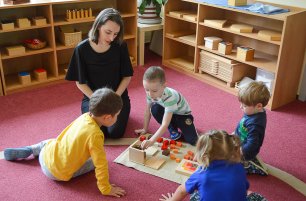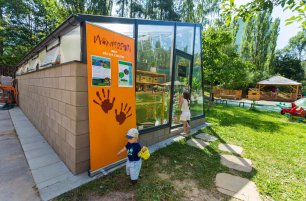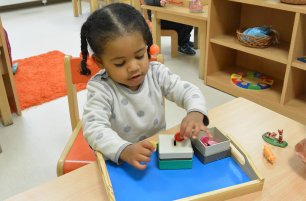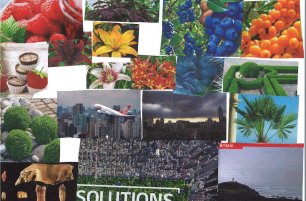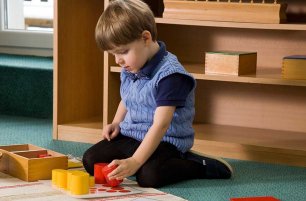Staff Interview: Lisa de Silva
Introducing one of our Primary teachers, Ms. Lisa from Western Australia, who has been with IMSP since 2017.
Since coming to Prague she has furthered her love of work in early childhood education and completed an AMS (American Montessori Society) Early Childhood (ages 3-6) Teacher Certification. Read more about Lisa in an interview with IMSP here:
You’re originally from Perth. How did you end up in Prague?
It was a bit of an accident! My husband and I were planning to go to Italy for our honeymoon and were looking up courses to learn Italian; instead, we came across a TEFL (“Teaching English as a Foreign Language”) course here in Prague and were just inspired to do something different. So, we added those four weeks to our honeymoon! Once we came to Prague, we just fell in love with the city, and decided to stay. We only went back to Perth to tie up our loose ends and clear out our things, and within nine months, were living here.
What do you enjoy most about life in Prague?
The environment is so different from Australia, including the nature and animals, which I just love – such a contrast to the Australian bushland. Czech culture took some getting used to in the beginning, especially the directness of Czech people. But I’ve also experienced wonderful open-mindedness, especially around the expat community.

Back in Australia, you had completed course work for serving disabled children. Was education always an interest for you?
I didn’t have a very strong sense of what I wanted to be when I was young, only that I wanted to help others, that was the seed of everything. Becoming a teacher felt overwhelming, but I did like the idea of working with children. The special education assistant course that I had found proved to be quite challenging, but also, as I’d thought, rewarding, and it taught me a lot about childhood learning and development. There was such a sense of awe and joy when I got to watch children focus, concentrate and thrive.
Coming into Montessori later, I saw a lot of things that fit very well with this work, especially in the foundations we lay through the Sensorial curriculum and sensorial learning in general.
What made you want to become a Montessori teacher?
I initially worked in childcare, which was such an interesting experience, and then later moved to the role of an assistant teacher. I gradually got to understand the philosophy, to see the impact of observation, to experience the way teachers would approach and communicate with the children. I was really inspired by seeing this continued focus on the individual child and their development or seeing how we guide children in processing their emotions and resolving conflict. And then of course – seeing the Montessori materials in action is just mind blowing. I was sold.

You experienced a traditional Australian education growing up. Based on your experiences, what would you say are the biggest differences between that and a Montessori education?
It is absolutely the holistic focus on the child as a person: the way we want them to grow into socially aware, expressive, emotionally literate people. Also, in Montessori, the children are guiding themselves – we give them an idea to explore. What I experienced myself was very top-down, not individualized at all, and focused on academics alone. I saw a lot of my peers either get lost behind or be ahead and get bored and demotivated.
What is your favorite thing about Primary age children?
The way we work with them from the concrete to the abstract, building on the child’s experiences. For example, recently we learned about the life cycle of the butterfly, observed it in the animal, and then children created their own life cycle projects. You could just watch their minds generalizing and abstracting the experience as they went. I also really love working with the peace education curriculum, giving children the opportunity to treat each other with kindness and support. And finally, the mindfulness aspect of both peace education and our Practical Life.
What life lessons did you learn from living abroad?
The person I am now is so different from who I was when I first moved. I gained a lot of patience, and a lot of “adult” independence – especially financial. Coming to a country with a very differently structured cost of living and a foreign currency was very challenging at first, so we learned a lot.
-3.jpg)
Have you had the chance to travel since moving here? Where’s somewhere you really enjoyed?
We have! Among my favorites was Lake Como in Italy, which was just amazing – I loved watching the play of the sun over the water. We also went to Warsaw for a weekend, and it was gorgeous, especially the beautiful gardens, art and museum exhibits.
How would you describe yourself if you had 10 seconds?
Enthusiastic and positive
What is your life motto or a quote you particularly enjoy?
“If you do what you love, you never work a day in your life.”
“Be kind, you never know what kind of day people are having.”
